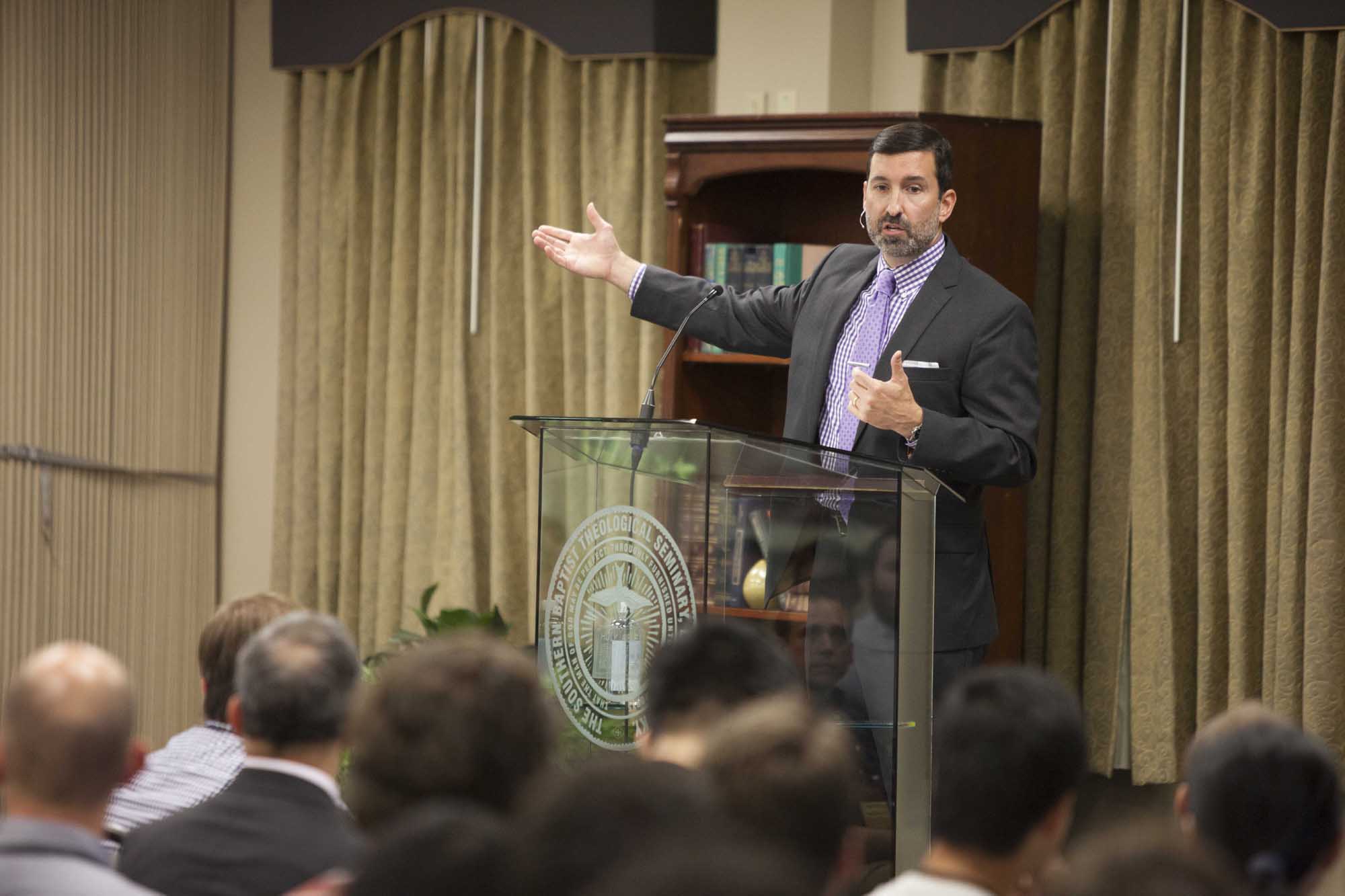
[SLIDESHOW=41098,41099,41100]LOUISVILLE, Ky. (BP) — Scholars from around the world gathered at Southern Baptist Theological Seminary to discuss the history of Christian persecution at the 9th annual conference for the Andrew Fuller Center for Baptist Studies.
“As the church of Jesus Christ in the 21st century, we do not operate from a position of strength, but that’s a good thing,” said Andrew Fuller Center research associate Jeff Robinson in a concert of prayer for the persecuted church that culminated the Sept. 15-16 conference in Louisville, Ky.
“We want to remember that we’re the persecuted church of Christ, and when we’re persecuted, we grow,” he said. “When we’re at ease in Zion, we tend to decline.”
Prior to leading conference attendees in a time of prayer for both persecuted Christians and their oppressors, Robinson recounted the story of Romanian Baptist pastor Josef Tson. When communist authorities threatened Tson in 1977 for preaching the Gospel, the pastor famously quipped, “Don’t you understand that when you kill me you send me to glory? You cannot threaten me with glory.”
Tson’s example of courage and perseverance in the face of suffering was also a topic for Union University Dean Nathan Finn, who presented a paper on communist persecution of Baptists in the 20th century. Finn, dean of the School of Theology and Missions and professor of Christian thought and tradition at Union, said the “militantly atheist” governments “routinely suppressed the freedom of religion” between 1917 and 1989 by expelling or executing Baptists. Communist countries North Korea and China continue to make headlines regarding reports of such brutality today.
“Everyone agrees that Islamic radicalism is the single biggest source of Christian persecution in the world today, but it isn’t the only threat,” Finn said.
“As long as communism continues to eke out an existence, Christianity will be threatened,” he noted. “Let’s remember to pray for two things: that communism will finally be rejected the world over and that Christians suffering in communist lands will be faithful even unto death.”
With disciplines ranging from New Testament studies, Baptist history and missiology, scholars delivered plenary sessions on the history of persecution from the Roman Empire to present-day sub-Saharan Africa.
Benjamin Hegeman, adjunct professor of intercultural studies at Houghton College and missionary in Benin, presented the conference’s final paper, “Islam and the Suffering Bride of Christ in Sub-Saharan Africa.”
Hegeman said sub-Saharan Africa — which includes Uganda, Sudan and Somalia — currently leads the globe in Christian persecution. The rise of Islamic jihadism wiping out Christianity in these nations, Hegeman said, began not as a response to Western civilization but as an “in-house cleansing” of moderate Islam.
Westerners must therefore hold government officials and the media accountable for acknowledging the religious factor in Islamic violence toward Christians, he said.
“Efforts to debunk, dismiss or negate the evidence of this growing persecution will not succeed as God will certainly allow a 21st-century ‘Foxe’s Book of Martyrs’ to be written uniquely for Africa,” Hegeman said. “Their blood cries out and they, of all martyrs, merit to be heard by the global church.”
Historians also discussed evidence of persecution of Christians in Ancient Rome, Anabaptists in Reformation-era Europe, and Baptists in colonial Virginia. Steve Weaver, senior fellow for the Andrew Fuller Center and senior pastor of Farmdale Baptist Church in Frankfort, Ky., said many Southern Baptists assume American Christians have always had religious liberty, but that was not the case in colonial Virginia.
Weaver noted the Virginian colony was established with the Church of England as the official church, allowing Anglicans to “prosecute and persecute” Baptists for converting their members “by the droves.” He said it was not until Thomas Jefferson brought religious liberty to Virginia in 1785 that Baptists were free from mob violence and imprisonment.
Yet, through this century of suffering, Baptists thrived as imprisoned leaders demonstrated complete satisfaction in Christ.
“The men of this era can serve as models for persecuted Christians in our day. Their faithfulness to Christ and conscience remains an inspiring reminder of the Christian call to discipleship,” Weaver said.
“Whenever persecution is experienced for the cause of Christ, as the Virginia Baptists and persecuted Christians of every generation have found, Christ is present and he is enough.”
While Virginia Baptists advanced and accomplished religious liberty, Anabaptists in Reformation-era Europe offer much wisdom on the subject as well, noted Jason Duesing, provost at Midwestern Baptist Theological Seminary.
Duesing said historians often ignore Anabaptists as “nuisances,” but they serve as models of endurance and free churches. While an evangelical stream of Anabaptists identified with the Reformers like Martin Luther and Ulrich Zwingli, they differed and therefore suffered because they advocated further reform, most notably the separation of church and state.
“These believers were standing under the conviction of what they perceived to be the biblical means for protecting Gospel essentials: The preservation and right articulation of the Gospel can only be accomplished through the preservation and right articulation of the church,” Duesing said.
The conference opened with plenary addresses on Christian persecution in the New Testament and early church. Thomas R. Schreiner, James Buchanan Harrison Professor of New Testament Interpretation at Southern Seminary, examined the persecuted churches the Apostle John addressed in Revelation.
Schreiner, who is publishing a forthcoming commentary on Revelation, said persecution for these churches was not an “all-out attack” but nevertheless threatened early Christians.
Other plenary speakers during the conference included Brian Vickers, professor of New Testament interpretation and biblical theology at Southern Seminary, and Bryan Litfin, professor of theology at Moody Bible Institute.
Prior to the event, the Center for Ancient Christian Studies hosted a Sept. 14 preconference, “Martyrdom in the Early Church: Fact and Fiction.” The free event featured presentations from Litfin; Jarvis J. Williams, associate professor of New Testament interpretation at Southern Seminary; and Southern Seminary alumnus Gregory Cochran, director of applied theology and associate professor at California Baptist University.
Audio and video of the Andrew Fuller Conference plenary sessions will soon be available online at sbts.edu/resources.

















